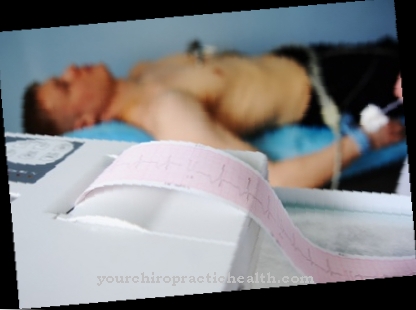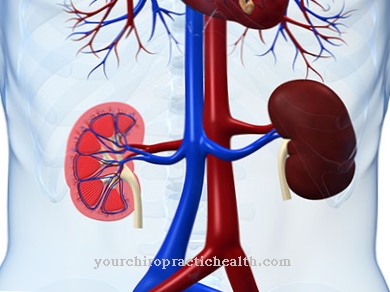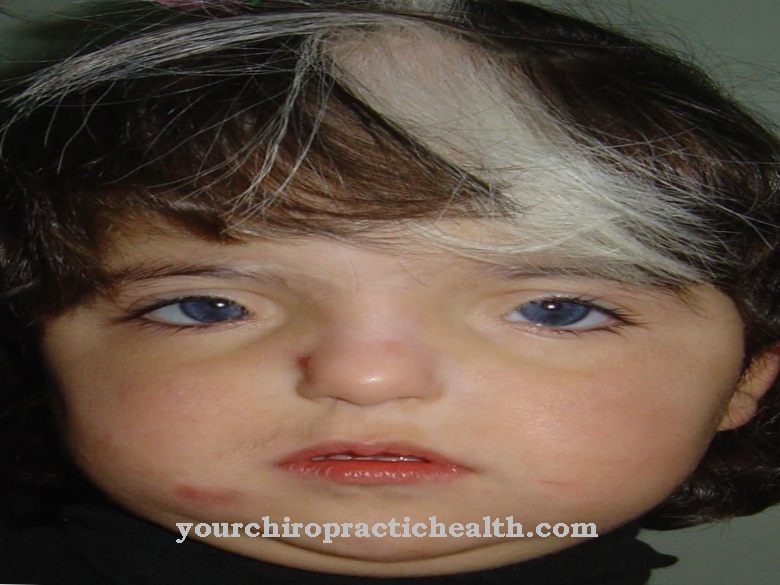The Klüver-Bucy syndrome describes a change in emotional expression. This is essentially processed in the limbic system. Damage leads to major changes in behavior.
What is Klüver-Bucy Syndrome?

© vasilisatsoy - stock.adobe.com
The Klüver-Bucy syndrome was named after its authors Heinrich Klüver and Paul Bucy. Heinrich Klüver was a German-American neuroscientist and Paul Bucy was an American neuropathologist. Together they researched changes in behavior in primates caused by lesions in the brain.
In 1936, in an experiment on animals, they succeeded in demonstrating an influence on emotional expression behavior. They carried out their lesion experiments on monkeys. They surgically removed both of their temporal lobes. As a result, the primates showed hyperoral as well as hypersexual behavior.
The test animals lost the sense of their own relevance to needs. They put all the objects in their mouths without being able to differentiate what consequences this could have. Her sexual behavior changed immensely. The mating behavior increased excessively. The animals were restless and showed hyperactivity. In humans, symptoms are comparable to those of Klüver-Bucy syndrome.
It leads to failures in the processing of emotions of all kinds. This has corresponding effects on emotional expression behavior. Symptoms can also occur when areas of the brain related to the temporal lobes are affected. Lesions of the amygdala in particular change the emotional experience immensely.
causes
The causes of Klüver-Bucy syndrome include lesions in the brain. In particular, it concerns the areas that count in the immediate vicinity of centers of emotional experience. The limbic system is primarily concerned with the occurrence of emotional events.
Klüver-Bucy syndrome is directly related to the removal of the temporal lobes. These are located in the immediate vicinity of the limbic system. However, the research found that lesions from neighboring brain regions also produced comparable results. Damage to the amygdala also leads to changes in emotional processing.
Fear and anxiety in particular are processed here and appropriate behavior prepared. They are used for protection in dangerous situations. Lesions in the temporal lobes and limbic system can be caused by other various underlying diseases. Herpes simplex encephalitis and circulatory disorders in the brain should be mentioned here.
Brain atrophy, i.e. age-related tissue loss, is also considered to be the cause of the syndrome. In addition, Klüver-Bucy syndrome can result from traumatic brain injury following accidents or operations. Tumors in the limbic system, hippocampus, or temporal lobes also cause the syndrome.
Symptoms, ailments & signs
One of the symptoms of Klüver-Bucy syndrome is a change in social behavior. Excessive behavior can be observed.This ranges from excessive eating and drinking to being aggressive with food and fluid restrictions. Hypersexual behavior could also be observed.
The changes in emotional experience clinically show the lack of emotional empathy. The expression of emotions is greatly changed or missing. It can lead to impairment or loss of sensations such as fear or fear. People with Klüver-Bucy syndrome show a tendency to cause oral hyperactivity.
Objects in the environment are examined with the mouth. The oral exploration behavior takes place very excessively. Existing emotions can quickly turn from fear to aggression. A regulation of the emotions is no longer sufficiently possible for the person concerned. Those affected show hypermetamorphosis.
Significantly more stimuli are taken into account here than under normal circumstances. Optical agnosia occurs in some cases. This is what is known as soul blindness, in which what is visually perceived can no longer be identified.
Diagnosis & course of disease
The diagnosis is made after an extensive medical examination. This leads to observations of behavior. In addition, the individual brain regions are examined for their functionality using magnetic resonance tomography.
Complications
The Klüver-Bucy syndrome leads to significant changes in behavior. These changes usually have a very negative effect on the life of the person concerned and his social contacts. This can lead to marginalization or bullying and teasing. The quality of life is significantly restricted and reduced by the Klüver-Bucy syndrome.
In most cases, the behavior is very aggressive. This occurs especially when the person is denied food or fluids. Furthermore, the patients often suffer from hyperactivity and often can no longer follow the consequences at school and suffer from concentration disorders. This can lead to significant restrictions and discomfort in development.
It is not uncommon for those affected to suffer from anxiety or sweating. The area is often examined with the tongue, which can lead to various infections and inflammations. In many cases, Klüver-Bucy syndrome cannot be treated.
The symptoms can possibly be limited and reduced with the help of various therapies. In most cases, however, a complete cure is not possible. In many cases, the parents and relatives also suffer from psychological complaints and therefore need psychological treatment.
When should you go to the doctor?
People who show a strong behavioral problem in direct comparison to the norm need medical attention. Excessive occurrence, overreaction in dealing with people from the social environment or strongly sexual behavior are warning signs that indicate a mental disorder. A doctor's visit is necessary as soon as the person concerned shows hypersexuality and has other sexual partners several times a day or a week. A doctor is needed in the case of intensive food consumption and aggressive behavior at the same time.
In many cases, depending on their current condition, sick people show a lack of insight into the disease. Therefore, relatives or other confidants are often obliged to carefully point out discrepancies to those affected. A consultation with a doctor is advisable beforehand so that the right steps can be taken for successful treatment. Oral fixation or oral hyperactivity indicate an inconsistency.
If adults examine objects lying around in detail with their tongues or if they increasingly put various objects in their mouths, a doctor's visit is required. Sick people perceive more stimuli than healthy people. Nevertheless, it is not possible for them to process the sensory stimuli sufficiently. Therefore, a doctor should be consulted if the person concerned cannot identify everyday objects as such.
Treatment & Therapy
The treatment of Klüver-Bucy syndrome is very complex. A complete healing has not yet taken place. The lesions in the individual brain areas are usually irreparable. To date, medical research has not been able to find a way to regrow or repair damaged tissue in the brain.
An exchange by means of a transplant is also currently not possible. For this reason, individual therapy is carried out with the focus on alleviating existing symptoms. This depends on the type and extent of the tissue damage. Eating habits are checked in everyday life.
Medicines act on symptoms such as hypersexuality. If seizures occur, these are also treated with medication. Medicines are also used for other psychotic symptoms. Most people suffering from Klüver-Bucy syndrome are fully hospitalized.
A lack of fear or shame is just as impossible to deal with in everyday life as sudden irritability or aggression. This can lead to a danger to yourself and others. Hyperoral behavior cannot be controlled. The oral tendency can only be minimized by administering various medications.
You can find your medication here
➔ Medicines against memory disorders and forgetfulnessOutlook & forecast
The prognosis for Klüver-Bucy syndrome is poor. To this day, scientists and researchers have not been able to find a way of healing or freedom from symptoms. The lesions in the brain are irreparable and do not allow the patient to recover. In addition, the syndrome often occurs in combination with other disorders that contribute to a deterioration in general health.
The treatment of a sick person, like their complaints, is extensive and extremely complex. Through various therapeutic approaches, successes are achieved and improvements made in individual areas. However, recovery is not possible. The behaviors should be optimized in therapy so that interpersonal contact with relatives is made possible. Long-term therapy is used for treatment. Discontinuing the prescribed medication leads to an immediate relapse and can cause life-threatening complications. Taking the medication can trigger additional side effects that must be taken into account when making an overall prognosis.
If the Klüver-Bucy syndrome is diagnosed, an inpatient stay is required. Without special therapy, there is a risk of self-harm and an increase in existing symptoms. In addition, the patient poses a danger to other people due to his special behavior in the area of behavior and must therefore be under appropriate supervision.
prevention
Preventive measures cannot be taken with Klüver-Bucy syndrome. This syndrome is caused by other underlying diseases. Since this is a sequela, it is not possible to take measures in advance or to carry out appropriate preventive examinations as with other diseases.
If one of the underlying diseases already exists, you can look for changes and indications by observing your own emotional experience. Attention should be paid to signs such as the intensity of the emotions and the expressive behavior. In Klüver-Bucy syndrome, there is a lack of emotion with simultaneous hyperactivity.
Aftercare
As a rule, the follow-up measures for Klüver-Bucy syndrome are severely limited or are not available to the person concerned. With this disease, a comprehensive diagnosis and treatment is primarily necessary so that the symptoms can no longer worsen. For this reason, a doctor should be contacted at the first symptoms and signs of the disease.
The damage to the brain in this disease is usually irreparable, so that a complete cure for this disease can no longer occur. Those affected are therefore dependent on permanent help and support from their own families and from friends and acquaintances in their lives and in everyday life. In doing so, intensive and loving discussions are often necessary in order to prevent possible psychological upsets or depression.
Cramps can be relieved with the help of medication. The person concerned should always observe the correct dosage and also take the medication regularly. If anything is unclear or if you have any questions, a doctor should be consulted first. As a rule, the life expectancy of those affected by Klüver-Bucy syndrome is significantly reduced, so that they die relatively early.
You can do that yourself
The possibilities for self-help are very limited in patients with Klüver-Bucy syndrome. The damage to the temporal lobes is considered incurable and cannot be changed even with self-help measures.
The behavior of the patient is above the norm and cannot be controlled. The feeling of fear is almost non-existent and the instinctual behavior cannot be controlled on its own. In everyday life, only a good relationship of trust with relatives and doctors can stop the patient's self-harming behavior. In many cases, however, the family members need comprehensive psychological support in order to be able to cope better with the patient.
The emotional burden for people from the social environment of someone suffering from Klüver-Bucy syndrome is enormous. Everyday life must be geared towards the symptoms of the disease. It is recommended that relatives use the range of stress-relieving methods. Due to the tissue damage in the brain, the sick person lacks insight into the disease and opportunities to change his behavior. The lack of understanding and the tendency to examine everything with the mouth trigger interpersonal problems and increase the risk of illness. Constant monitoring and care of the patient is necessary so that he does not end up in a life-threatening situation. The entire environment should be tailored to the needs of the patient to improve the quality of life.

.jpg)











.jpg)

.jpg)
.jpg)











.jpg)